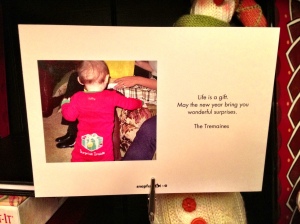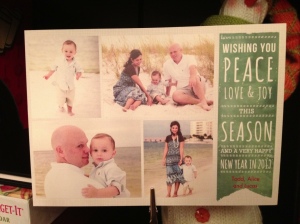
Watching “Private Practice” is one of my guilty pleasures. The TV show chronicles the lives and medical practices of a group of doctors. Aside from all the relationship drama in the show, I like how the doctors collaborate about their patients and enhance each other’s views about complex medical issues. Their joint clinic is named “Oceanside Wellness Center” and seems to aim at providing holistic care to their patients.
Recently a character from the show (“Erica”) was found to have an inoperable brain tumor and a life expectancy of 6-9 months. This was especially devastating due to the fact that she has a young son (“Mason”) who has only recently developed a relationship with his father (“Cooper”, one of the doctors at Oceanside). For the past three episodes, Erica and Cooper have been disagreeing on whether Erica should take on chemotherapy treatments. A neurosurgeon told Erica that cure is not possible and chemo might extend for life for a couple of months. Cooper believes that by undergoing treatments Erica will have more time with her son and possibly even find a cure for her illness (should a new drug develop in the very near future). However, Erica decides after consulting with the neurosurgeon that she would rather spend every healthy moment with her son and letting the illness take its course rather than spending her time in treatments. She reconsiders her decision, however, when her symptoms start getting out of control and she is no longer capable of hiding her disease.
So far, so good. What disturbed me were the ways in which stereotypes about end of life care and issues were reinforced in the storyline (even if hospice care was never mentioned). When Charlotte is comforting her husband Cooper, she tells him that Erica needs him to help her understand “why she should fight the disease” by undergoing treatments. She also says that having treatments is “the hard way” of dealing with the illness (meaning the brave way). So when Cooper has a heart-to-heart conversation with Erica about this, he tells her that she needs to “fight” because “maybe we’ll get lucky” and “maybe it will show Mason how much you care.” Once again, you see, “fighting” cancer/terminal illness is equated with undergoing aggressive medical treatments and is also equated with being noble and courageous. Deciding not to pursue curative treatments is equated with “giving up” and “not caring”, and maybe even being cowardly.
These associations are wrong in so many levels that I cannot address them adequately on this blog. But I’ll try to address some of it. First, please understand that I am not saying “Erica” is wrong to pursue chemotherapy or that anyone who makes that choice in the face of terminal illness is wrong to do so. She is a young woman who is otherwise healthy, and has a young son. Who can fault her for wanting to live as long as possible? God knows I would. The problems I have with the show are:
1) They made it seem like it was a clear-cut decision between living longer with chemo treatments (even if life might be “rough”), or living shorter without treatments. The reality is that chemo or radiation do not always extend life. Conversely, good end of life care with hospice or a palliative care team can often prolong life expectancy.
Surprised? It’s true. Those of us who work in hospice care often see our patients improve survival rates once they receive hospice/palliative care. There are many reasons for this, including close monitoring and management of symptoms, and the spiritual and emotional support patients receive in such programs. Palliative care and hospice are designed to provide comfort care, and thus increase patients’ quality of life. When quality of life increases, patients are more resilient and often live longer than predicted. Here is reference to one of several studies on this.
2) The idea that one should always choose curative treatments, no matter what the cost, and no matter how remote/elusive the cure is (if they truly care about life or about their loved ones).
Have we considered that there are more important things than finding a cure? Things such as living with dignity, spending meaningful time with loved ones, leaving a leguacy, finding emotional and spiritual healing, and yes – even preparing for death.
Look, I get it. We don’t want to miss out on the chance that things could be restored back to “normal” if we only did this treatment or that. I mentioned on a previous post that my dad has ALS, which is a fatal disease. Every now and then my step mother tells me she is looking for an experimental treatment and is willing to sell anything and move anywhere if my dad has the smallest chance of finding a cure. I know he would go, too. And I, too, imagine sometimes what it would be like if he did find a cure through a stem cells treatment in Israel or Korea.
I also imagine what it would be like for my dad to relocate to another country and spend all of his remaining time subjecting himself to arduous treatments. Right now he enjoys good quality of life: a comfortable home, good care, and meaningful conversations with family and friends who drop by often. He is spending whatever energy he has on doing things he enjoys with the people he loves. What if all his energy were spent on “fighting”? What toll would it have on his body and soul, on his dignity? What if it costs him and his wife all of their savings and possessions? Call me crazy, but, to me, that is too big a gamble. (Here is an article that illustrates this well. I would quote some of it here if this post weren’t already humongously long).
It could also be said that one may “fight” terminal illness by utlizing other resources such as complimentary medicine. But truthfully… I’m not sure about this notion that fighting is the thing to do. It seems to me there is a lot of energy involved in constantly saying NO!! to everything around us by trying to reverse things at all cost. Being in that fight mode may also entail bitterness for how things are, and even more bitterness if things are not reversed as expected. To me, there may be something very courageous and healing about saying YES, this is my life, and I am embracing it rather than fighting against it.
3) And finally… it bothers me that, in a holistic medical practice, there was no mention or discussion of hospice or even palliative care. Not even a palliative care consultation? Guess the Oceanside doctors didn’t read the recent study in the New England Journal of Medicine showing that early palliative care (in conjunction with cancer treatments) prolongs life and reduces suffering.
Cicely Saunders, the physician who founded modern hospice, once said, “We are the medicine.” We have become so enamoured with the drugs, machines and apparatus that modern medicine has given us, that we sometimes forget they are but tools in the hands of healers. They are not the whole medicine. We are.
To the writers of “Private Practice”: if you add an awesome chaplain to your mix of characters, all will be forgiven. 🙂
Photo by Wikipedia.


![IMG_0424[1]](https://geraniumseeds.files.wordpress.com/2012/02/img_04241-e1328932448143.jpg?w=179&h=185)
